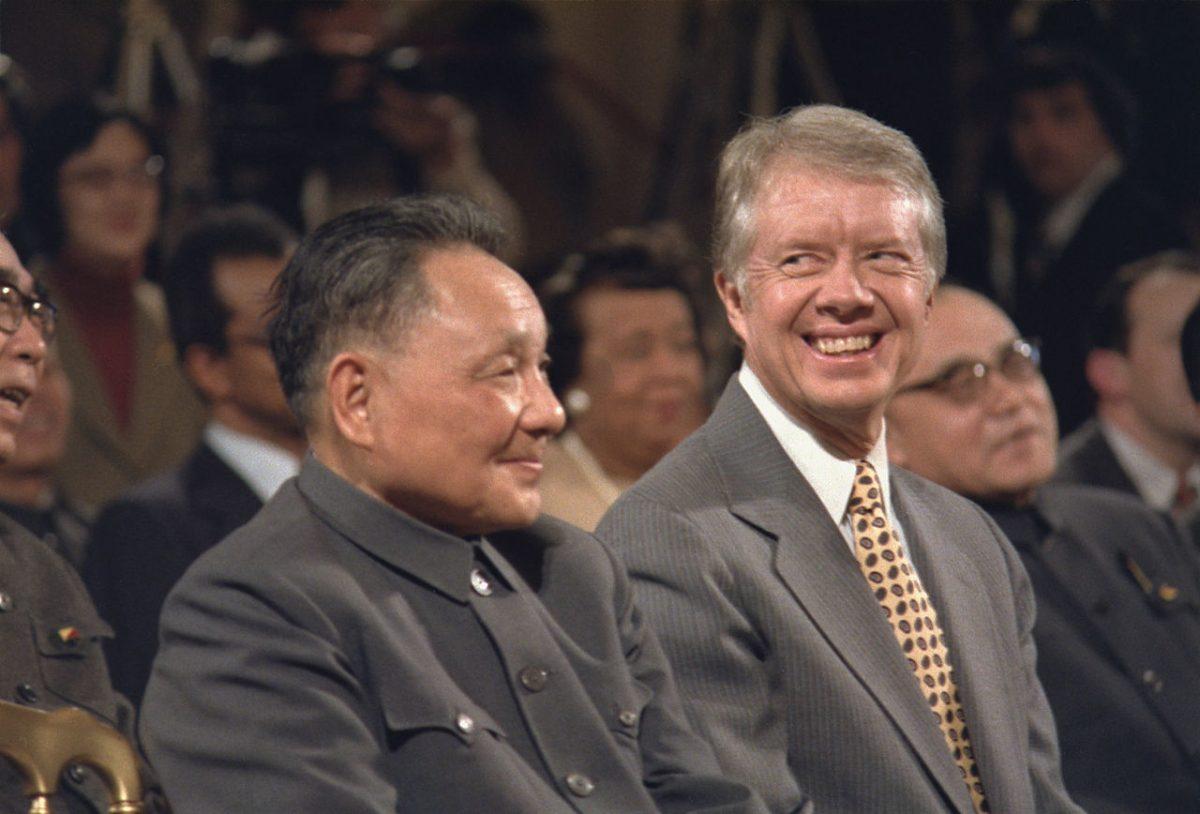About a dozen Wellesley students took a break from their midterm study sessions last Thursday to attend a presentation by Wellesley’s foremost sinologists and a webcast Q&A with former President Jimmy Carter. The event was part of the eighth annual China Town Hall, a national day of programming on China involving over 70 cities throughout the United States.
The presentation and webcast at Collins Cinema was presented jointly by Wellesley College and The National Committee on U.S.-China Relations. During the first part of the event, Professor William A. Joseph from the political science department and Professor C. Pat Giersch from the history department shared their personal journeys and academic research in China. The two were followed by President Jimmy Carter’s responses to a series of questions streaming in via Twitter.
Giersch said that understanding China today is so important partially because of China’s increasing economic, military and political clout in shaping world events.
“But if we also realize that American understandings of China have historically been weak, then it becomes even more important that those in the United States develop clear, evidence-based insights into China,” he added.
Joseph started his reflections on the encounter with China by recounting his first trip in June 1969 to Macau, then an undeveloped Portuguese colony, not the casino capital of Asia today. On a hill on Macau’s border with China, he used binoculars to see barbed wires, soldiered watch towers and a huge anti-American propaganda poster just under a mile away on the Chinese side of the border. Joseph and his companions were en route to Taiwan because Americans were not allowed to travel to China at the time.
“I thought to myself at the time, ‘Why in the world am I studying a country that I’ll never be able to visit?’” he said. “But, lo and behold!”
Joseph also showed the audience a picture of himself in his mid-20s, with oversized sunglasses and hippie hair, standing in front of the iconic Mao Zedong portrait on Tiananmen Square three years later, in 1972, after the Nixon administration moved towards normalization of diplomatic relationships with China.
At both Cornell and Stanford, Joseph was involved in the Committee of Concerned Asian Scholars (CCAS), which was made up of students and faculty members who were interested in American policy in Asia. The CCAS was one of the first citizen organizations to be sent to China. The visit culminated in a four-hour meeting with then Chinese Premier Zhou Enlai.
During the meeting, each member of the CCAS had a five to ten-minute individual conversation with Premier Zhou.
“[Zhou] was well informed about us,” Joseph said, “It was a very personal conversation. Zhou had met some of the graduate students’ advisors, and asked ‘How is so and so [advisor] doing?’”
Joseph’s reflections on his meeting with Zhou Enlai was followed by Giersch’s account of his more recent China story. In 1990, Giersch was an English teacher at Beijing Normal University. Giersch’s life in China involved trying to get past the segregation, learning how to make dumplings, attempting to write Chinese calligraphy and biking on Beijing’s then wide and uncrowded boulevards.
“When I first went to China, I was surprised at people’s interest in and enthusiasm for the United States, how much money [U.S.] people made, how many cars they had, their ideas, all sorts of things,” Giersch said. “There was also a fascination with American military power.”
Giersch concluded on the note of changing Chinese attitudes towards America between 1991 and 2001, which transitioned well into the Q&A with former President Carter. In the course of an hour, Carter gave his views on a dozen questions on topics including Chinese democracy and freedom of worship, American weapons sale to Taiwan, cyber security and U.S.-China trade relations.
On the question of democracy, especially in light of recent events in Hong Kong, Carter suggested that Americans could use a little more patience and should not rush to judgment.
“It took us 12 years to get a constitution, and we look at some countries trying to write a constitution after one year with condemnation,” Carter said.
Joseph described the webcast as an excellent opportunity to see the former president answer questions in such a relaxed setting. On the question of democracy, however, Joseph raised the caveat that, unlike other developing countries such as Brazil and South Africa, China still lacks the foundation of democracy.
Like Joseph, Xueyin Zhang ’16 also exhibited some reservations over the way Carter’s answers portrayed current Chinese political and socioeconomic situations.
“Some of the information conveyed was inaccurate and potentially misleading,” Zhang said.
Because of this, Zhang thinks that, while Wellesley should host more similar events, the community also needs to be aware of the fact that the information presented may lack accuracy.
Like Zhang, Beijing native Ziyu Wang ’18 welcomes more such events at Wellesley. She described the professors’ presentation as informative and personal.
“Through their photos, I could finally imagine life of my grandparents,” Wang said, “It was also very informative, and it propelled me to reflect upon the education I received back in China, including the patriotism propaganda.”
For Zhongji Wu ’16 from Nanjing, China, the most important takeaway was the realization of the tremendous change in China over the past 30 years.
“Growing up after the economic reform of 1978, sometimes I forget what China was like before that,” Wu said. “But hearing the talks by President Carter and the two professors really made me realize that China has gone a very long way, and more challenges are still to come in the future.”




